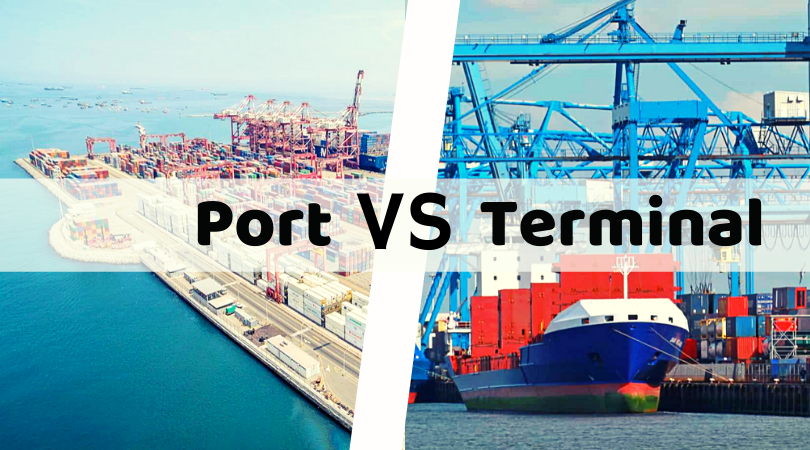Ports VS Terminals
Ocean Shipping is the heart of the global economy.
Some popular terminologies associated with shipping include are harbour, port, terminal, berth, quay, pier, and jetty.
Let’s have a look on port and a terminal as that confuses most of the people.
Port
A port is a landed area (often at the seashore) that provides lodging for boats and cargoes. It serves as a point of transaction for imports & exports shipment. In Brief, a port is a place within the harbour where a ship can dock for a commercial purpose of either handling cargo or passengers or taking care of the ship’s requirements.
Since the port also serves as a boundary between land and sea, it functions as the meeting point where trains and trucks arrive to offload or export contents into the ship or pick up a cargo off the ship.
There are different types of ports based on their uses. Still, the most crucial section are the port authorities, administration, depots, cargoes, and vessels. Examples of ports are inland port, fishing port, warm water port, dry port, and seaport.
Ports are controlled by a Port Authorities, which regulates the prices to ensure uniformity and the safety of goods, cargoes, and passengers. Port authority in a nation is the governmental authority that is responsible for constructing and maintaining crucial aspects of trade and transportation on the seaports.
It is essential to know that the first port authority was established in the year 1908 and is known as "The London Port Authority."
Importance of Ports
-
Employment opportunities: The availability of ports necessitates the availability of people that will work in them. Sometimes, it takes weeks or months to offload cargoes off a ship. Hence, the higher the number of human labour involved the faster the work rate.
-
Socio-economic development: Ports are essential links for foreigners to connect to neighbouring or international cities for trade activities. The higher the number of ports a country owns the higher its trade relations with neighbouring countries. This, in turn, boosts the country's GDP and also fosters economic growth.
-
Environment-friendly: Transportation by sea is one of the cheapest means of conveying people and goods from one place to another. Other means of transportation are known to have polluted the environment one way or the other, but marine transportation isn't one of them.
-
Commercialization: A port is a major trade centre in the nation because producers and consumers troop in from different regions of the world to make transactions. Recently, there is an advancement in technology that involves the use of various types of equipment such as forklift and cranes to facilitate smooth negotiations between clients and manufacturers.
Terminal
A terminal is a location on a seaport where loading and unloading of people or goods take place. In other words, it is more like a "checkpoint" where goods, cargoes, or passengers are offloaded. Usually, there can be several terminals across a seaport.
In one port there could be terminals for
-
Container Terminal
-
Ro-Ro (Roll On-Roll Off) Terminal (popularly known as Car Terminal)
-
Oil & Gas Terminal
-
Bulk Cargo Terminal
-
Multi-Purpose Terminal
Differences between a Port and a Terminal
Now that we have understood a comprehensive study on what ports and terminals are, let's study their unique features.
1. A port is a station used for commercial and trade activities such as loading and unloading cargoes and other activities that generate income.
In contrast, a terminal is like a "checkpoint" on a port where incoming shipments are thoroughly inspected and documented. Thus, we have as many terminals as possible on a port.
2. A terminal is a specific part of a port dedicated to a particular activity. For example, on a port, there can be different terminals for oil and gas, crude oil, building materials, automobiles, and so on.
A port is a central station that houses all of the terminals. It serves as a shelter for all cargoes, ships, boats, and port officials. Simply put, a port is a warehouse for everything that is meant to be loaded or offloaded on a ship.
Source:


















